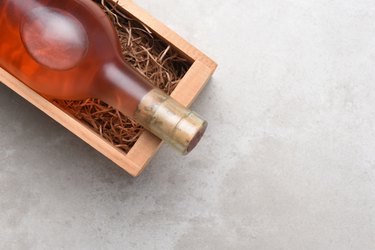
White zinfandel sometimes gets a bad reputation as a low-quality wine, but it's got a deliciously sweet, refreshingly fruity flavor that pleases many palates. White zinfandel calories are just 108 per 5 ounce glass, but those can add up if you're not careful.
White zinfandel was accidentally first crafted by Sutter Home Family Vineyards in 1972. Since then, the wine has been a staple because of its lightness and versatility. It goes with all types of dishes — from spicy to sweet. It also marries well with meat, salads and fish.
Video of the Day
Video of the Day
Tip
A typical glass of White zinfandel has about 108 calories per 5-ounce glass. One 750-milliliter bottle has about five glasses, or 540 calories.
White Zinfandel Calories and Nutrition
White zinfandel has about 108 calories per 5-ounce glass. That puts white zinfandel's calorie count below those of other popular wines: Chardonnay has about 120 calories per glass, Sauvignon Blanc has 122 calories and Riesling clocks in at 130.
White zinfandel is a slightly-sweeter form of a rosé wine. Rosé wines are made from red grapes, but winemakers only give the wine limited exposure to the skins during processing. This results in the characteristic pink hue and lighter flavor. An average glass of rosé has 126 calories.
Read more: 5 Hidden Health Benefits of Alcohol
White zinfandel is sweeter than other rosés because the winemakers stop fermentation before all the sugar is converted to alcohol. This means a glass of white zinfandel, from the maker Sutter Home, has 8.6 grams of carbohydrates. On average, a glass of rosé has 5.6 grams of carbs, all of which are sugar.
Red wine tends to have fewer carbohydrates than white wine. A 5-ounce glass of Pinot Noir, for example, has just 3.4 grams of carbohydrates. All wine is fat-free and contains just trace amounts of protein.
Potential Benefits of White Zinfandel
White zinfandel calories, carbs and sugar content are all important if you're counting calories to lose weight. Too many glasses can put your daily calorie count over the threshold of what your body burns, and prevent you from reaching your physique goals.
Too many glasses can also be an issue when it comes to your health. The Journal of Public Health published a large , comprehensive study of alcohol consumption in a September 2016 issue. While regular moderate consumption of alcohol — equal to 5 ounces of wine, 12 ounces of beer or 1 ½ ounces of spirits per day — may afford several health benefits including improved cardiovascular health, excessive intake can increase your risk of high blood pressure, obesity, stroke, accidents and breast cancer.
Moderate consumption of alcohol, particularly wine, does seem to have a positive effect on general health. Many of these benefits have been attributed to compounds in red wine, but lighter-colored wines also offer benefits, according to research published in an issue of Circulation in October 2017.
White wine offers different health-promoting mechanism than red wine does. Compounds known as tyrosols, caffeic acid and shikimic acids are believed to be responsible for white wine's cardioprotective effects.
These protective effects of wine may only be valid if you exercise, too, explains research presented at a conference of the European Society of Cardiology in August 2014. Red wine and white wine had the same minimal effects on improving cholesterol levels in participants, but when exercise at least twice per week was included with either red or white wine consumption, cholesterol levels improved. Researchers write that these results suggest a potential synergy between low doses of ethyl alcohol in wine, and exercise that creates protection against cardiovascular disease.
- Sutter Home: "White Zinfandel"
- Circulation: "Wine and Cardiovascular Health"
- USDA Nutrient Database: "Rose Wine"
- Journal of Public Health: "Key Findings on Alcohol Consumption and a Variety of Health Outcomes From the Nurses’ Health Study"
- European Society of Cardiology: "Wine Only Protects Against CVD in People Who Exercise"
- USDA Nutrient Database: "Pinot Noir Red Table Wine"